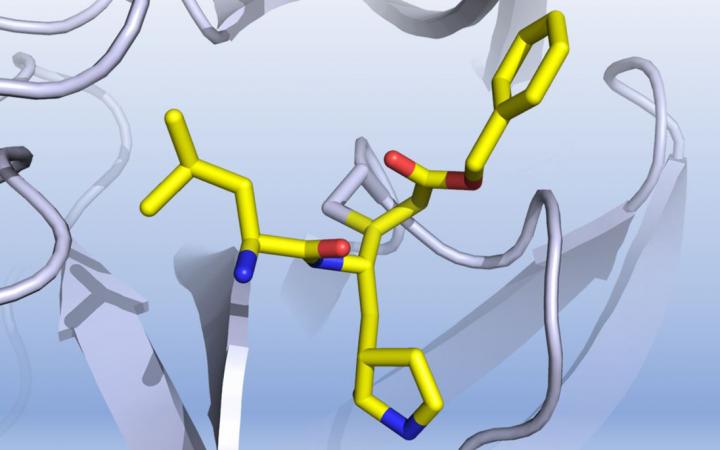
Credit: Professor Luke Guddat
An international team of researchers has tested more than 10,000 compounds to identify six drug candidates that may help treat COVID-19.
The research, involving University of Queensland scientist Professor Luke Guddat, tested the efficacy of approved drugs, drug candidates in clinical trials and other compounds.
“Currently there are no targeted therapeutics or effective treatment options for COVID-19,” Professor Guddat said.
“In order to rapidly discover lead compounds for clinical use, we initiated a program of high-throughput drug screening, both in laboratories and also using the latest computer software to predict how different drugs bind to the virus.
Professor Guddat said the project targeted the main COVID-19 virus enzyme, known as the main protease or Mpro, which plays a pivotal role in mediating viral replication.
“This makes it an attractive drug target for this virus, and as people don’t naturally have this enzyme, compounds that target it are likely to have low toxicity.
“We add the drugs directly to the enzyme or to cell cultures growing the virus and assess how much of each compound is required to stop the enzyme from working or to kill the virus.
“If the amount is small, then we have a promising compound for further studies.”
After assaying thousands of drugs, researchers found of the six that appear to be effective in inhibiting the enzyme, one is of particular interest.
“We’re particularly looking at several leads that have been subjected to clinical trials including for the prevention and treatment of various disorders such as cardiovascular diseases, arthritis, stroke, atherosclerosis and cancer,” Professor Guddat said.
“Compounds that are already along the pipeline to drug discovery are preferred, as they can be further tested as antivirals at an accelerated rate compared to new drug leads that would have to go through this process from scratch.”
After the enzyme’s structure was made public, the team received more than 300 requests for more information, even before the paper was published.
“To provide an analogy, we’ve provided scientists with a fishing pole, the line and the exact bait, and have in only one month caught some fish,” Professor Guddat said.
“Now it’s up to us and the other fisherman – our fellow scientists globally – to take full advantage of this breakthrough.”
“With continued and up-scaled efforts we are optimistic that new candidates can enter the COVID-19 drug discovery pipeline in the near future.”
###
The international collaboration was led by researchers at ShanghaiTech University.
The research has been published in Nature (DOI: 10.1038/s41586-020-2223-y).
Media Contact
Luke Guddat
[email protected]
Related Journal Article
http://dx.




